Ask NMSU’s new president, Valerio Ferme, what drives him and shapes his leadership style, and he’s quick to cite the influence of his parents, who instilled in him a sense of civic responsibility – an obligation to do good in the world with the privilege that you have.
“You have to make sure that you’re contributing to the well-being of those around you,” Ferme says. “I feel much more fulfilled by trying to work with other people to get to a better place. So that’s the beauty. It’s what drives me every day.”
Growing up as one of nine children in Milan, Italy, Ferme enjoyed the teamwork and shared responsibility of helping to care for his siblings, even as he focused on his classical studies, thanks to his mother’s emphasis on academics.
“My mom was a constant example of the kind of person who, if she could go and do something for others, she would,” he says. “And so that was a lesson that was instilled in me all through my life.”
That parental support afforded him the opportunity to attend college in the United States, where he earned undergraduate degrees in biology and religious studies at Brown University, competing as a member of a nationally top-ranked crew program, and later coaching the freshman squad, following two years of coaching at the U.S. Naval Academy.
Always an avid reader, he went on to earn master’s degrees in comparative literature and Italian studies from Indiana University, along with a Ph.D. in comparative literature from the University of California, Berkeley, where he was awarded Fulbright and Chancellor’s fellowships.
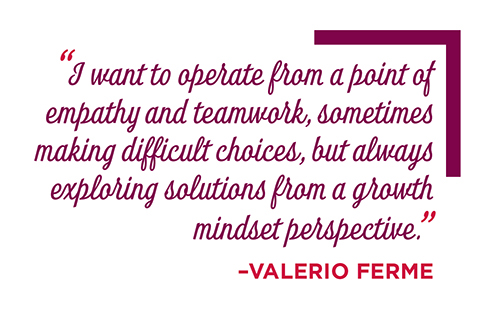 He found his first teaching position in higher education at the University of Colorado, where he taught for 19 years and later served as divisional dean for the Arts and Humanities. It was during his time in Colorado that he found himself wanting to start a family and looked into fostering and adopting to fulfill his desire to give back for the privilege his life afforded him.
He found his first teaching position in higher education at the University of Colorado, where he taught for 19 years and later served as divisional dean for the Arts and Humanities. It was during his time in Colorado that he found himself wanting to start a family and looked into fostering and adopting to fulfill his desire to give back for the privilege his life afforded him.
“I felt that in many ways, you know, I was given much,” he says. “My parents gave me incredible opportunities, and I felt that maybe it was my time to pair these two things: become a parent, and at the same time do something that was good for others.”
As a single gay man, Ferme wasn’t sure what would happen when he walked into the adoption social services office in Boulder County, but after some training and an overview of the challenges that come with fostering and adopting, he was accepted as a foster parent. Although he had planned to take in a very young child, Ferme was drawn to the children in the system who were ages 8, 9 and 10, and still waiting for a permanent loving home.
One boy in particular – Michael, a 10 ½ year old who was living in a group foster home that would soon close – stood out to him. As is so often the case for older children in foster care, Michael had been through a rough childhood and struggled with several issues. Ferme says being able to build a strong one-on-one relationship with Michael helped him adapt, even though as an adult, he had to face many challenges related to his childhood trauma.
A few years later, Devin, another young boy who had been through much difficulty and disappointment, joined their family. One way that Ferme processed his experience as the adoptive father of two boys was to write a blog exploring the challenges and rewards of his parenting journey. These writings caught the eye of an Italian-born social worker living in London who was also interested in adoption. Giorgio Corda reached out to Ferme and the two began a correspondence that would ultimately lead to their marriage after Corda’s move to the U.S.
Michael and Devin, now adults, eventually left the nest and started families of their own, but the challenges of their early childhoods continued to make their adult lives and parenthood difficult to navigate. When Michael’s twin girls, Lucy and Serenity, were toddlers and his son, Dante, was just a baby, they came to live with Ferme and Corda, who have raised them ever since. More recently, Devin’s daughter, Autumn, joined her cousins.
Raising grandchildren while navigating a career trajectory that has now led to a university presidency hasn’t always been easy, but Corda says all these experiences have shaped Ferme’s values and leadership style in important ways.
When Autumn first arrived, Corda says, it was difficult for her three cousins to accept the changes to their family unit. He and Ferme saw this and changed their approach.
“For a while, we substituted the word ‘family’ with the word ‘team,’” Corda says, “because in the concept of ‘team,’ the people may come and go, but they have the same objective, and they work together to achieve something.”
The kids became the Fantastic 4, each choosing a superpower and exploring their roles in the family team. It’s not perfect, Corda admits, but it has given the children a new framework for navigating their changing relationship.
He says that’s a strategy that Ferme brings to his leadership approach, as well.
“We had lots of conversations about teamwork and how we want everybody to succeed, and how we want to empower each other to do things,” Corda says, “and Val keeps a very similar approach at work. It was interesting to me to see how he would explain to the kids these things in simple language, and how he would encourage them to work together and not only not fight, but to accept the different perspectives of people and find that bit in common that would pull them together.”
In many ways, enabling children to work out their differences has been an adaptive skill, Corda points out. Ferme uses similar perspective-taking approaches in engaging concerns raised by faculty and staff as well. One of the goals he has expressed for the university is to build a culture of gratitude and collaboration that fosters productivity, fulfillment, creativity and the sense of purpose for what employees do as individuals and teams at an educational institution.
“It’s about being more inclusive, understanding and respecting differences, respecting each of the life stories that people bring to the table, even though, as professionals, we also have to figure out how to do our job collaboratively in a constant give-and-take,” Ferme says. “My athletic and personal experiences really taught me a lot about teaming in the workplace.
“It’s a difference. I don’t operate like many other people in these roles,” he says. “I want to operate from a point of empathy and teamwork, sometimes making difficult choices, but always exploring solutions from a growth mindset perspective.”
That difference is on display at the University Residence, where the Saltillo tiles in the formal dining room are sometimes sprinkled with brightly colored toys and sparkly shoes, and a sitting room now boasts a bookshelf full of board games and action figures. But the values taught here about honesty, integrity, listening and working together are the same values that Ferme tries to bring with him to Hadley Hall every day.
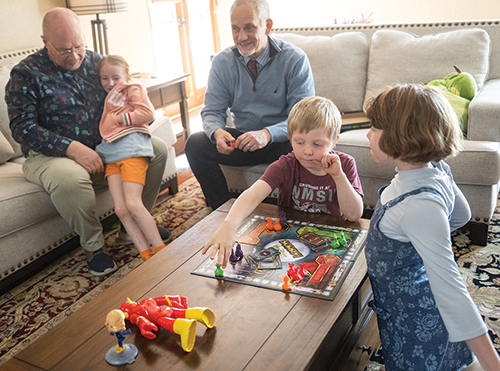
Lucy, right, and Dante play a game of Sorry! on the coffee table as Autumn snuggles with Giorgio Corda and Valerio Ferme watches the fun.
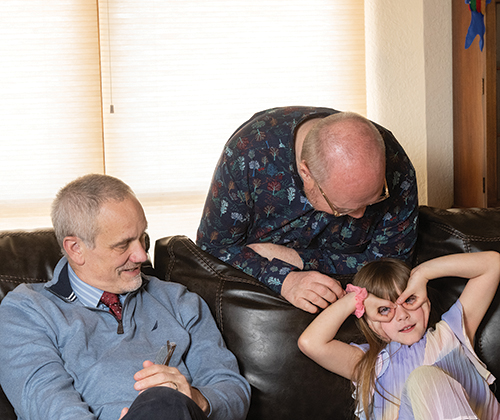
Serenity goofs around with her grandfathers.
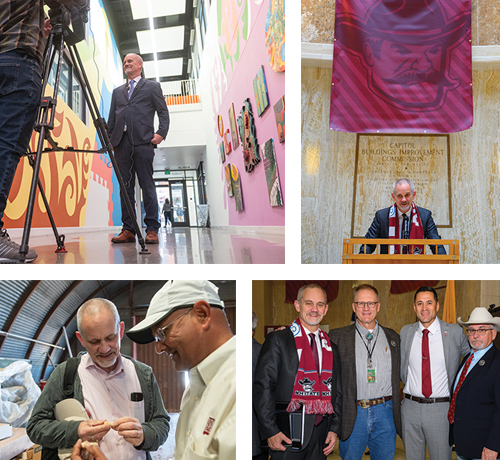
Clockwise from top left: NMSU President Valerio Ferme speaks with reporters before an introductory reception at the University Art Museum. Ferme speaks during NMSU Day at the Capitol during the legislative session in Santa Fe and poses with state Rep. William Hall, Assistant Vice President of Government and Community Relations Clayton Abbey and state Rep. Randall Pettigrew. Ferme talks with Naveen Puppala, peanut breeder, during a tour of the Agricultural Science Center at Clovis.
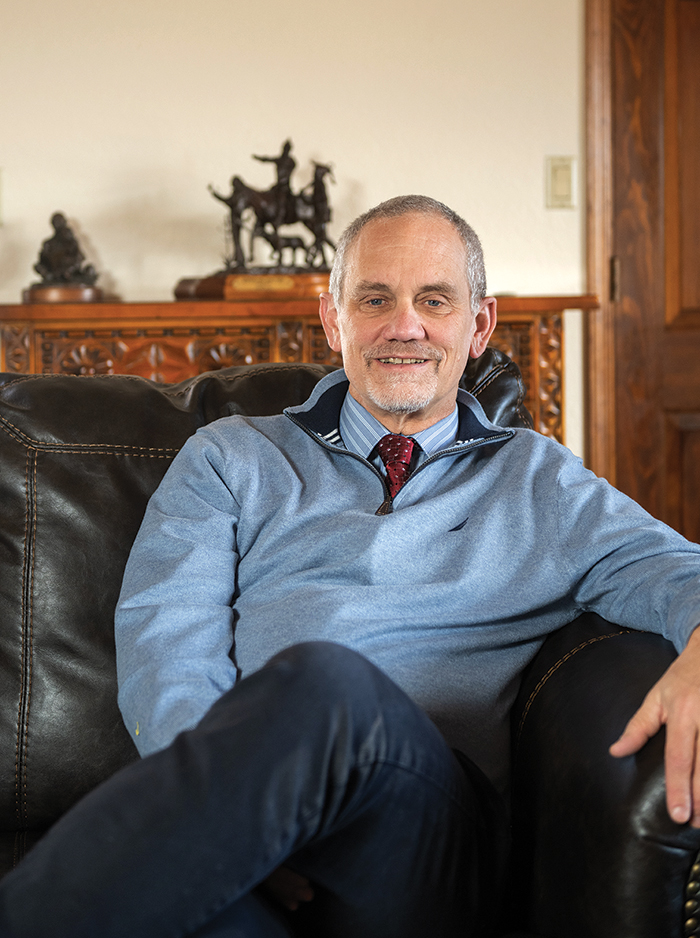
NMSU President Valerio Ferme relaxes at home in the NMSU Residence.
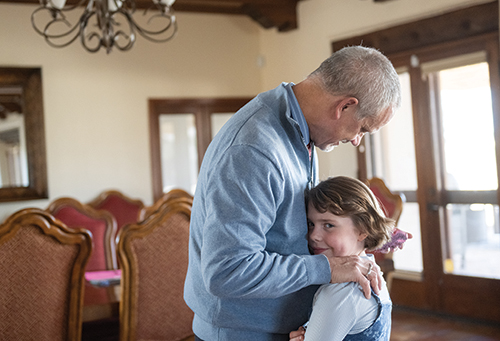
Ferme helps Lucy get ready for photos.

Dove Hall, Room 212
305 N. Horseshoe Drive
Las Cruces, NM 88003